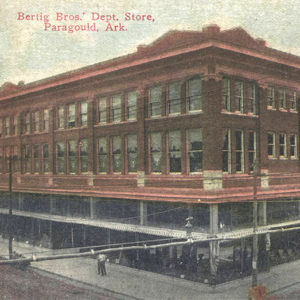calsfoundation@cals.org
Adolph Bertig (1853–1926)
Adolph Bertig, a Jewish immigrant, was one of the leading merchants and financiers in northeastern Arkansas and southeastern Missouri during the late nineteenth and early twentieth centuries. He was later known as the “Merchant Prince of Paragould.”
Ad Bertig was born on June 21, 1853, in Kraków, Galicia, part of what was then the Austrian Empire. He was the eldest son of Wolff Jozef Bertig and Maryem Cortel Bertig.
Bertig was nineteen when he immigrated alone to the United States in 1872, arriving first in New York, then migrating west to Little Rock (Pulaski County). While in Little Rock, he gained employment from one of the town’s most prominent businessmen, Colonel John G. Fletcher, who sent Bertig peddling goods to the rural communities of central and eastern Arkansas. After accumulating enough wealth, Bertig opened his first business, Bertig and Epstein, in Ozark (Franklin County) and arranged for his younger brother, Saul Bertig, to relocate to Arkansas from Austria.
On January 9, 1881, Bertig married Mary (Mamie) Rosenbaum of St. Louis, Missouri; they had two children.
Bertig sent his brother to Paragould (Greene County) to open one of the earliest businesses in the new town—a mercantile establishment named Bertig Bros. The initial success of their small store in Paragould led Ad, Mary, and their children to move to Paragould in 1884. In the 1890s, the Bertigs invested in a railroad—the Paragould Southeastern Railway—which they extended to the town they established, Bertig (Greene County), to aid the region’s timber industry. By 1909, Bertig Bros. mercantile was considered one of the most successful firms in northeastern Arkansas. From here, Bertig ventured into nearly every business opportunity available, including retail and wholesale, a real estate company, a cotton plantation system, banks, railroads, and several civic opportunities that developed as Paragould grew. After twenty years of business in Greene County, the Bertig name was well known throughout much of northeastern Arkansas and southeastern Missouri, and Bertig’s efforts helped establish the infrastructure that transformed Paragould from a rural agricultural community to a cosmopolitan town in Greene County.
With the Bertig businesses in decline because of the deteriorating cotton markets and the closure of the Paragould Trust Company, Bertig took his own life at his home in Paragould on December 12, 1926. Controversy surrounded his death; it remained in the newspaper headlines for two weeks. The subsequent closing of banks led to the foreclosure of Bertig land and the closing of many of their gins and stores. The economic effects of Bertig’s death reverberated throughout Greene County as many lost their employment. Bertig is buried at Linwood Cemetery in Paragould.
For additional information:
Johnson, Elizabeth Elaine. “Prejudice, Progress, and Preservation: The ‘Bertig Dynasty’ of Northeast Arkansas, 1870–1950.” MA thesis, Arkansas State University, 2016.
LeMaster, Carolyn. A Corner of the Tapestry: A History of the Jewish Experience in Arkansas 1820s–1990s. Fayetteville: University of Arkansas Press, 1994.
“The Rise and Fall of Ad Bertig.” St. Louis Post-Dispatch, January 30, 1927, p. 97.
“Started in Little Rock—Bertig Bros. of Paragould Move Into a New Building That Cost $75,000.” Arkansas Democrat, December 1, 1909, p. 12.
Elizabeth Johnson
Middle Tennessee State University
 Business, Commerce, and Industry
Business, Commerce, and Industry Louisiana Purchase through Early Statehood, 1803 through 1860
Louisiana Purchase through Early Statehood, 1803 through 1860 Bertig Bros.
Bertig Bros. 




Comments
No comments on this entry yet.